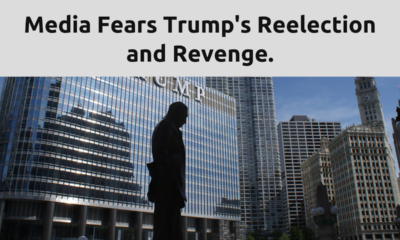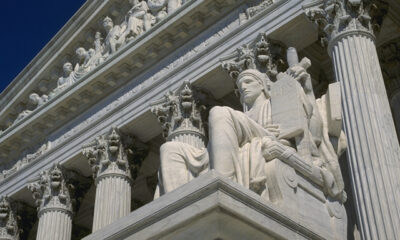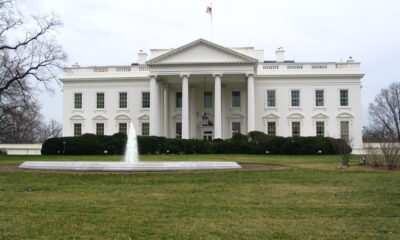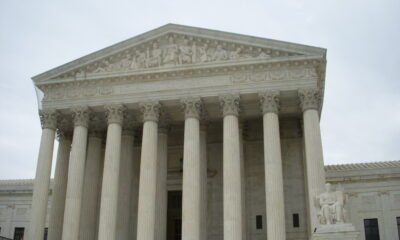Constitution
Constitutional immunity for Trump?
A new analysis by a team of Constitutional legal scholars reveals that Donald J. Trump enjoys full constitutional immunity for his every act.
An advocacy group for the Constitution recently published an astonishing theory, but one that grows from recent Supreme Court precedents. By this theory, Donald J. Trump enjoys absolute immunity from prosecution for his every act while he was President. It sounds absurdly simple – but in fact relies on the common sense of the Framers. They were the most educated men of their day – so we can expect them to be familiar with the precedents of Western civilization in a way very few people are today. For that reason alone, this theory of constitutional immunity makes sense.
Donald Trump v. Julius Caesar
Events today disturbingly mirror events in ancient Rome, still the source of most of our law. Julius Caesar still holds the record for being a nationalist populist subject to spiteful attacks – and bills of attainder – from an “establishmentarian” legislative body. For reasons no historian can defend, the Senate of Rome, its members insanely jealous of Caesar, determined to prosecute him, confiscate his wealth, and send him into permanent exile. They passed a series of laws to this end after Caesar won the Gallic War.
Caesar tried every possible stratagem to avoid this, including recruiting two famous intercessors – literally, tribunes of the plebs. These were public magistrates who could literally forestall any action of the State by saying, “I forbid” – in Latin, veto. (Technically the Romans referred to this power as intercession; we call it “the veto” from that verb – “I forbid.”)
Then one day the consul Lucius Cornelius Lentulus Crus stood up in the Senate and declared a national emergency – against that power of intercession. At once a then-current intercessor stood up and said, “You cannot possibly do that; I forbid that!” The consul ordered his attendant men-at-arms to remove him. Which they did, whereupon that tribune, and one of his colleagues, addressed whoever was assembled in the Roman Forum at the time, then galloped off to the town of Ancona.
That intercessor was, of course, Mark Antony. And Caesar, receiving the message in Ravenna, crossed the Rubicon, with a single legion. The rest is history.
An informative example
It is far safer to assume that the Framers were fully cognizant of the full story of Caesar crossing the Rubicon when they wrote the Constitution, than that they were ignorant of it. That is why they added the power of impeachment. Before anyone could proceed against a civil officer of the United States, the Senate must remove him from office. (And they can only do that after the House of Representatives brings an accusation against him; that’s what “impeachment” means.) The Constitution goes on to say that:
Judgment in Cases of Impeachment shall not extend further than to removal from Office, and disqualification to hold and enjoy any Office of honor, Trust or Profit under the United States: but the Party convicted shall nevertheless be liable and subject to Indictment, Trial, Judgment and Punishment, according to Law.
The implication should be clear: one can prosecute a President for his acts as President, but only after the Senate first convicts him of high crimes and misdemeanors by reason of those acts.
That probably explains why Mark Meadows, once Donald J. Trump’s chief of staff, has filed a Notice of Removal to get his election-challenge case out of the Georgia courts and into federal court. Thus far, Trump has not done the same. But according to an organization of Constitutional scholars, he should.
Constitutional immunity explained
The National Constitutional Law Union explained their theory last week in a “Strategy Memo Against the Trump Indictments.”
Mr. Todd J. Aldinger, their Director of Litigation, lays out the theory of constitutional immunity in seventeen pages. He relies on two of the biggest cases the Supreme Court decided last year:
- New York State Rifle and Pistol Association v. Bruen, and
- Dobbs v. Jackson Women’s Health Organization.
The particulars of those two cases don’t matter. After all they treated radically different controversies, and different Justices wrote their respective opinions. But Mr. Aldinger recognized this common thread in both opinions. That is: the meaning of any part of the Constitution is fixed according to the common understanding of it when the Framers, or the Congress, wrote it and legislatures, or conventions, ratified it.
Thus Clarence Thomas, in Bruen, found gun laws and regulations beyond the body of such law in 1791, unconstitutional. Likewise Samuel A. Alito found no basis for any Constitutional protection of a “right” to abortion. Abortion was unlawful in most jurisdictions in 1868 (the time of the Due Process Clause of the Fourteenth Amendment). Certainly it was unlawful in most jurisdictions in 1791 (the time of the adoption of the Fifth Amendment).
So logically the extent and scope of executive power, including constitutional immunity from prosecution, is the same as that for other executives of the period, except as the Constitution itself limits it.
Contemporaneous arguments
Aldinger and his colleagues rely heavily on the published remarks of the Framers, contemporary to the Constitutional ratification process. It might surprise modern readers to hear Benjamin Franklin, for example, argue that without impeachment, the citizens’ only recourse was assassination! (That’s most ironical, because Donald J. Trump holds the record for assassination attempts, which previously belonged to Gerald R. Ford.) Similarly, two Framers (including John Adams) held that, to subject the President to ordinary legal processes would be to risk stopping the machinery of government. Impeachment was the balance. First remove the offender from office; then subject him to those ordinary legal processes.
The NCLU then applies another salient Supreme Court precedent: Nixon v. Fitzgerald, 457 U.S. 731, 756 (1982). That case held specifically that:
The President has absolute immunity from liability for civil damages arising from any official action taken while in office.
Today we hear Trump’s detractors actually saying that he must win election to stay out of prison. That alone should illustrate the importance of the Nixon precedent. How many Presidents would seek to become Presidents for Life if this maxim did not hold? (Franklin D. Roosevelt effectively became a President for Life. How many prosecutions might someone have undertaken against him, had he not literally died in office in 1945? Beginning with his abuse of a then-controlled substance, specifically, absinthe?)
How constitutional immunity applies to Trump
The NCLU treats only the first three indictments, because the fourth wouldn’t come down for another two days. Their point in treating each of the three then-current cases is: they all treat his actions while he was President.
One can argue for constitutional immunity in two ways, one simple, one not so simple. The simple argument is that for what a President does, no local prosecutor can touch him. Not unless the House impeaches him and the Senate convicts him. In fact the House impeached Trump twice, and the Senate acquitted him each time.
The not-so-simple argument requires placing each of his acts within the “outer perimeter” of his authority and responsibility as President. This is the detailed language of the holding in Nixon. Regarding money-to-keep-quiet that he paid privately to stop a blackmail threat, he was acting within his authority to prevent salacious exposure from distracting him from his duties.
The Documents Case proposes to try Trump for espionage for taking classified documents with him on his last day. Special Counsel Smith asserts that Trump was no longer entitled to those documents after he ceased to be President. But: he transported those documents out of the White House while still President. In conveying documents from Donald Trump, President to Donald Trump, Private Citizen, Trump was within his authority. Even if the Presidential Records Act did not so state, this follows from the grant of “the executive power,” without limit, to the President.
The January 6 case
We now come to the January 6 case, the statements Trump made that day, and the order of events. The Democratic controlled House of Representatives had their shot at impeaching Trump on a charge of “incitement to insurrection.” Again, the Senate acquitted him of that. So no authority, even federal, can charge him with that today.
To be sure, Special Counsel Smith is not charging him with that. Instead he is charging Trump with conspiracy to subvert the process of counting electoral votes. No one even tried to impeach him for that, and again, he has no Senate conviction on his record. Besides, it is for the President, not for Special Counsels or even judges, to determine how to “take care that the [Electoral Count Act] be faithfully executed.”
Lastly the NCLU observes that no President has ever declared a pardon on himself. Recall that Presidents can grant reprieves and pardons in all cases except impeachment. According to the NCLU, Presidents don’t routinely pardon themselves because they don’t have to.
As others have observed, no one has ever before charged a President, after he left office, for conduct in office. The Democrats tried their second impeachment, knowing that this was their only shot. For them to come back to this well now, violates every Constitutional principle for which they pretend to stand. It also violates the inherent power of any chief executive of a sovereign nation-state.
No former President has ever faced criminal charges and there are good and proper reasons for that. It’s not because they were perfect in office and angelic once they left office. It is rather because we once understood the value of this country and that its idea was perishable and fragile. The generations of the past understood that there had to be limits on the use of government power. But this group of Democrats is different. They are so good, so pure, so righteous, that anything they do is justifiable. That attitude has resulted in the total depravity of government from law enforcement to justice. Political opponents can be canceled or shut up or if necessary, locked up.
Nor should we doubt that constitutional immunity would apply to the Georgia case also.
Terry A. Hurlbut has been a student of politics, philosophy, and science for more than 35 years. He is a graduate of Yale College and has served as a physician-level laboratory administrator in a 250-bed community hospital. He also is a serious student of the Bible, is conversant in its two primary original languages, and has followed the creation-science movement closely since 1993.
-

 Constitution4 days ago
Constitution4 days agoPrecinct Strategy scores again
-

 Education5 days ago
Education5 days agoTitle IX revision sparks State revolts
-

 Civilization3 days ago
Civilization3 days agoLegacy media already assume Trump wins
-

 Civilization3 days ago
Civilization3 days agoSCOTUS Is Last Bulwark Against Critical Legal Studies
-

 Civilization21 hours ago
Civilization21 hours agoAntisemitism – and misguided legislation
-

 Civilization3 days ago
Civilization3 days agoEnergy Pipeline Companies Should Follow the Rules of the Road
-

 News4 days ago
News4 days agoTime to Fly – Really Fast
-

 Education4 days ago
Education4 days agoThe Road Back to Normalcy Starts Where the Problem Began: College Campuses












